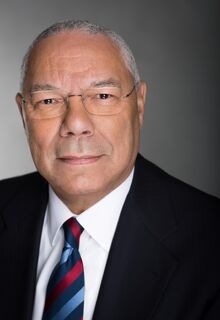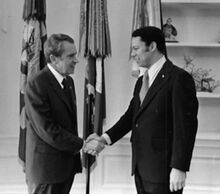|

Overview[]
Colin Powell is an American politician and former military official.
Pre-Doomsday[]
Colin Luther Powell was born in Harlem, New York City on April 5, 1937. His parents, Luther Theophilius Powell and Maud Arial Powell, were Jamaican immigrants. Powell was raised in the South Bronx.
During his school years, Powell worked at a furniture store and picked up some Yiddish from the Jewish shopkeeper and many of the customers. Powell received a Bachelor of Science degree in Geology from City College of New York in 1958. During college, he joined the ROTC, later describing it as one of the happiest times in his life.
Powell joined the US Army and served in the Vietnam War. Powell observed US tactics in the war, and later expressed ideas on how to avoid making similar mistakes in the future.

A young Colin Powell meets President Richard Nixon during his fellowship at the White House.
After Vietnam, Powell served a White House Fellowship during the Nixon Administration, while studying at the National War College.
By the early 1980's, Powell was serving at Fort Carson, Colorado. From there, he was selected to serve as senior military assistant to Ronald Reagan's incoming Secretary of Defense, Caspar Weinberger. Powell assisted Weinberger during the successful US military action in Grenada.
He was still serving on Weinberger's staff on Doomsday.
Doomsday[]
On the night of Doomsday, Powell was en route to China, along with Secretary Weinberger and other staff members, for a planned five-day summit. However, while approaching Chinese airspace their plane suddenly received word that the Soviets had just launched an all-out attack on the United States. Correctly assuming that Beijing was a likely Soviet target, Weinberger ordered the plane to divert from its course.
The Pacific[]
Secretary Weinberger and Major General Powell knew that the nearby US bases in Okinawa and South Korea would certainly be targeted by Soviet missiles, so their plane flew a course that took it south and east into the Pacific. After several days of flying and sending out distress signals on American military channels, not certain whether any American military outposts had survived, the plane's pilots received a crackling signal. It turned out that the USS Carl Vinson aircraft carrier had survived after escaping from Hong Kong, and was heading deep into the Pacific Ocean. The carrier's commanding officer was patched through to Secretary Weinberger. After a conversation, it was decided that Secretary Weinberger's plane would land on the deck of the Vinson and Weinberger and his entourage would shelter aboard the aircraft carrier.
